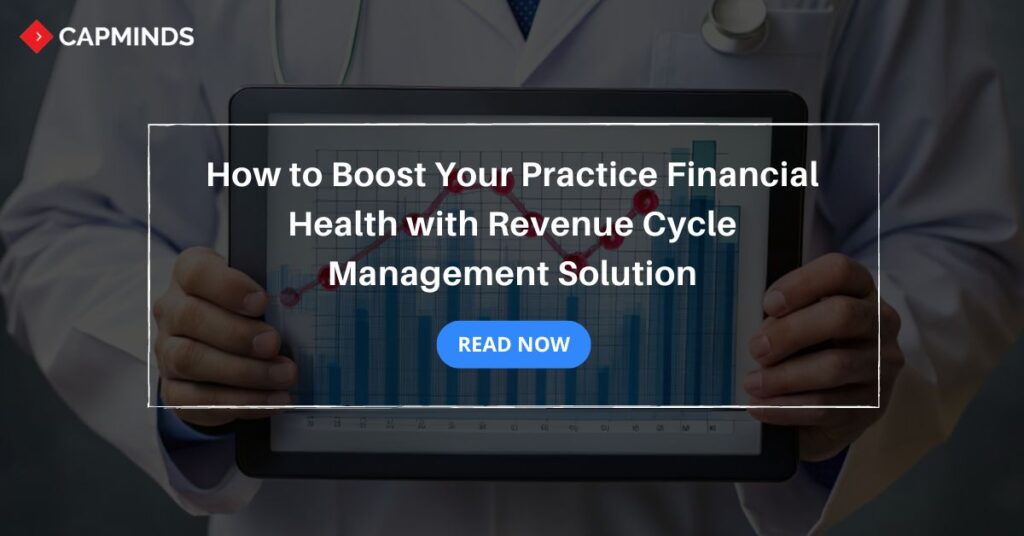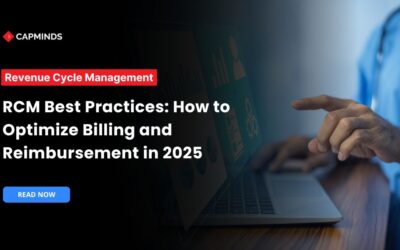How to Boost Your Practice Financial Health with Revenue Cycle Management Solution
Managing all healthcare operations alongside providing healthcare for patients is the most daunting task. Moreover, ensuring the practice of financial health is crucial for success. With the rising cost of healthcare and claim denials, an efficient RCM solution is necessary to get proper reimbursements.
When it comes to revenue cycle management, there are no shortcuts or skipping steps. It will directly lead to claim denials which affects the practice’s financial health. In this blog post, you’ll learn the 10 effective strategies to improve your revenue cycle for practicing financial health.
What is Revenue Cycle Management in Healthcare?
Healthcare Revenue Cycle Management is a process, from the initial patient registration to final payment collection. This process includes all the clinical and administrative operations. This helps practices to capture, manage, and collect patient service revenue.
An efficient revenue cycle management in the healthcare process includes:
- Patient Registration: Collecting patient information, and verifying insurance eligibility and coverage.
- Insurance Verification: Confirming patient insurance details and benefits to ensure coverage for planned services.
- Charge Capture: Recording services are provided for patients to generate accurate billing information.
- Medical Coding: Translating healthcare services into standardized codes for billing and insurance claims.
- Claims Submission: Sending coded claims to insurance companies to reimburse services rendered.
- Payment Posting: Applying payments received from insurance companies and patients to their accounts.
- Denial Management: Addressing and resolving claims that insurers have denied.
- Patient Collections: Managing the collection of outstanding payments from patients for their healthcare services.
Each revenue cycle management process requires maximum efficiency. One small mistake in the process will lead to payment delays and claim denials & rejections.
Related: How Modern Tech Can Help Manage Your Revenue Cycle
10 Strategies to Improve Revenue Cycle for Boosting Practice Financial Health
Improving the revenue cycle for healthcare practice can boost financial health. Here are the best 10 strategies to improve revenue cycle management:
1. Improve the Appointment Scheduling
The initial stage of the revenue cycle is appointment scheduling or patient registration. During this initial process, practices should collect all the necessary information like:
- Patient Demographics
- Insurance Information
- Appointment Details
- Financial Information
- Additional Information (Patient medical history, allergies, medications)
To simplify this process, leverage EHR appointment scheduling and patient portal scheduling system.
This will encourage patients to self-schedule appointments and collect all the essential information from their end. Consider sending automated reminders to reduce no-shows and missed appointments.
2. Automate the Eligibility Verification System
Checking insurance eligibility is crucial in the revenue cycle management process. However, eligibility verification is a repetitive task, healthcare practice can automate this process with advanced solutions.
Automating the insurance eligibility verification can help reduce errors, accelerate the revenue cycle, and allocate resources for other operations.
- Consider using software solutions that directly connect with insurance companies for real-time eligibility checks.
- Automating this process will reduce the risk of human errors in data entry.
- Fast identification can help to speed up patient check-ins and billing.
This way, practice can ensure accurate patient information, enhance billing accuracy and efficiency, and improve financial performance.
3. Invest in Skilled Team Members
Hiring a skilled team member especially for the RCM is important. Skilled individuals already have knowledge and expertise in the process. Practice can ensure maximum performance enhancement.
- Look for individuals with expertise in medical billing and coding.
- Ensure staff members are up-to-date with the changing regulations and best practices.
- Invest in role-based specialists like coding specialists or billing auditors.
Well-trained and experienced staff members can ensure accuracy in coding, timely follow-ups, and overall improved financial health of the practice.
4. Stay up-to-date with the Changing Processes.
Healthcare RCM is not consistent, the regulations and technology changes. Staying up-to-date with the changing regulations is crucial for practices. Staff members must ensure:
- Staying on top of new laws and payer requirements.
- Implement the latest tools and software solutions.
- Engage in discussions and training to stay updated.
Keeping up-to-date with the changes helps to avoid compliance issues. Practices can ensure smooth operation. Provide training sessions and resources for staff members.
5. Accurate Billing and Coding
Medical billing and coding is an important part of RCM. So, it requires maximum accuracy to get proper reimbursements. Also, it will directly impact practice revenue.
- Adhere to the latest coding standards and updates.
- Regularly review coding practice for accuracy.
- Ensure all the provided services and procedures are thoroughly documented.
This way, practices can minimize claim denials. Ensures practice is reimbursed correctly for the services provided.
6. Multiple Payment Methods for Patients
Make it more convenient for patients to pay their medical bills.
This will ensure those payments are made efficiently. Each patient prefers various payment methods. So, healthcare practices can offer various payment methods.
- Accept various payment methods like credit/debit cards, digital wallets, and more.
- Offer flexible payment plans for large balances
- Ensure all transactions are secure and compliant with regulations.
7. Manage Denied Claims and Follow-ups Timely
Claim denials are one of the huge challenges in healthcare RCM. Managing claim denials is crucial to maintaining cash flow.
- Use denial management tools to monitor and categorize denied claims.
- Promptly address and appeal denials with accurate information.
- Identify trends and make process improvements to reduce future denials.
Practices should timely follow-ups and appeals of denied claims. This way, practices can maximize getting reimbursed.
8. Enhance Claim Processing
Submitting claims to insurance companies timely is important.
However, practices can streamline this process using software solutions. This way, practices can reduce delays and improve financial performance.
- Use electronic claim submissions to speed up processing.
- Double-check claims for accuracy before submission.
- Track claims through their lifecycle to address issues promptly.
Improving claim processing ensures faster reimbursements and fewer claim rejections.
9. Provider Credentialing Process
Credentialing is a process in which healthcare providers need to be verified by insurance companies. Streamlining this process will help to ensure timely reimbursements.
- Keep detailed and up-to-date provider information.
- Use online portals and automated systems for faster processing.
- Regularly check and renew credentials before they expire.
This way, practices can prevent delays in claim processing and support practice growth.
Related: A Guide to Credentialing in the Medical Billing Process
10. Continuously Improving RCM with KPIs
Practices should continuously improve RCM performance. Consider utilizing key performance metrics (KPIs). This will help to drive continuous improvement in RCM.
- Focus on metrics such as claim denial rates and days in accounts receivable.
- Establish targets based on KPI data to drive performance enhancements.
- Analyze KPI data regularly to identify areas for improvement.
On-going assessments with these KPIs support informed decision-making. This helps to optimize revenue cycle management.
CapMinds Revenue Cycle Management Solution for Your Healthcare Practices
Effective revenue cycle management is essential to improve healthcare practices’ financial health.
To avoid the drawbacks, minimize claim denials, and improve your revenue cycle management, an expert must be put into use in your practice.
At CapMinds, we are bringing a comprehensive solution to make your billing and coding experience better. Our medical billing team expedites your entire billing process. Utilizing our Revenue Cycle Management Solution, your healthcare practice benefits from:
- 24/7 Support: Always available for your queries.
- Dedicated Client Manager: Personalized service for your practice.
- Efficiency and Accuracy: Streamlined billing, fewer claim denials.
- Financial Optimization: Maximize revenue, and correct underpayments efficiently.
- Enhanced Cash Flow: Timely collections, and improved financial management.
- Compliance and Security: Adhere to industry standards always.
We optimize your charges, submit your claims, on-time collection, reduce accounts receivables, identify underpayments, and increase your practice’s net collections, thereby better clinical and service expansion.
We also have a dedicated client manager who will be exclusively assigned to you. And the team will be available around the clock to assist with your queries.
“Reach out to CapMinds to make your medical billing process easier and more effective”




